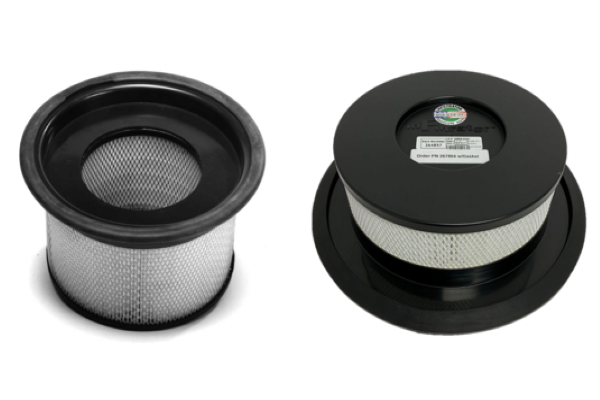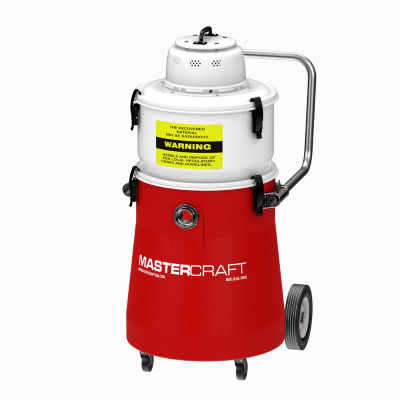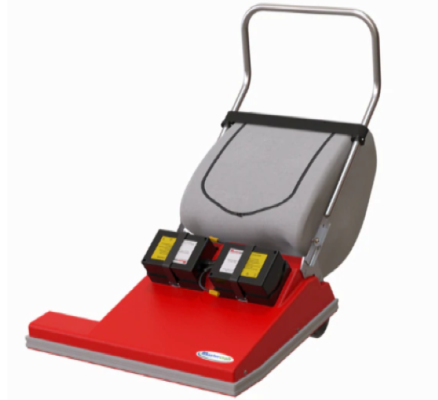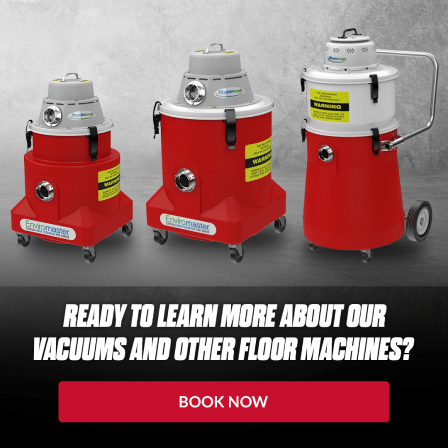How to Choose: Residential Vacuums vs Commercial Vacuum Cleaners
Vacuum cleaners are essential tools for maintaining cleanliness and hygiene in both residential and commercial settings. However, it's important to understand that not all vacuums are created equal. Commercial vacuums and regular vacuums differ significantly in terms of design, functionality, and performance.
In this article, we will explore the distinctions between these two types of vacuums, enabling you to choose the most suitable option for your specific cleaning requirements.
What is the Difference Between a Commercial Vacuum and a Regular Vacuum?
Choosing between a residential vacuum and a commercial vacuum cleaner depends on the specific cleaning needs and environment. Commercial vacuum cleaners excel in high-traffic areas and large commercial spaces where powerful suction, durability, and advanced filtration are crucial. Residential vacuums, on the other hand, are designed for more modest cleaning tasks in smaller homes or apartments.
Here, we will compare and contrast to help you choose the most suitable option for your needs.
Suction Power and Performance
One of the primary disparities between commercial vacuums and regular vacuums lies in their suction power and overall performance. Commercial vacuums are specifically engineered to handle heavy-duty cleaning tasks in large spaces, such as offices, hotels, and retail stores. They boast powerful motors and advanced technology, providing exceptional suction that effectively removes dirt, debris, and even stubborn particles from various surfaces.
Regular vacuums, on the other hand, are designed for lighter cleaning duties in residential environments and may not possess the same level of suction power as their commercial counterparts.
Durability and Construction
Commercial vacuums are built to withstand the rigors of daily, intensive use in commercial environments. They feature sturdy construction with durable materials, reinforced components, and robust mechanisms. These machines are engineered to endure heavy foot traffic, frequent movement, and demanding cleaning tasks.
Regular vacuums, while still capable of delivering reliable performance, are generally designed for less rigorous use and may not have the same level of durability as commercial models.

Filtration and Allergen Control
Commercial vacuums often prioritize advanced filtration systems, including HEPA filters, which effectively trap allergens, dust, and fine particles. This is especially important in commercial settings where air quality is crucial for the health and comfort of employees and customers. Regular vacuums may also offer filtration options, but they might not be as sophisticated as those found in commercial models.
Cleaning Tools and Accessories
Commercial vacuums come equipped with a wide range of specialized cleaning tools and accessories to tackle diverse cleaning challenges. These tools may include crevice tools, upholstery tools, dusting brushes, and more, catering to the specific needs of commercial environments. Regular vacuums typically provide a more limited set of cleaning tools, focusing on common household cleaning requirements.
Design and Mobility
Commercial vacuums are often larger and bulkier compared to regular vacuums, featuring wide cleaning paths and large wheels for enhanced maneuverability across different floor types. They are designed to cover extensive areas efficiently, making them ideal for spacious commercial spaces. Regular vacuums, especially upright models, are generally more compact and lightweight, offering greater convenience for maneuvering around furniture and storing in residential settings.
Types of Commercial Vacuum Cleaners
Commercial environments demand powerful and efficient cleaning solutions to maintain cleanliness and hygiene. Commercial vacuum cleaners are specifically designed to tackle the unique challenges of large spaces, high foot traffic, and diverse surfaces. Understanding these options will help you select the most suitable vacuum cleaner for your commercial cleaning needs.
Upright Vacuums
Upright vacuums are the most common type of commercial vacuum cleaner. They feature a single unit with an integrated brush roll and suction head, making them ideal for cleaning large carpeted areas efficiently.
Upright vacuums often have adjustable height settings, various cleaning attachments, and strong suction power to effectively remove dirt, debris, and allergens from carpets and rugs. They are popular choices for offices, retail spaces, and hotels.
Wide Area Vacuums
Wide-area vacuums are specifically engineered to cover large floor areas quickly. They have a wide cleaning path, typically ranging from 28 to 38 inches, enabling efficient cleaning of open spaces like hotel lobbies, conference halls, and retail stores.
These vacuums are known for their high productivity and time-saving capabilities. They are equipped with powerful motors and large-capacity dust collection bags to handle significant amounts of dirt and debris.
Canister Vacuums
Canister vacuums are versatile cleaning machines widely used in commercial applications. They consist of a separate canister unit connected to a cleaning head by a flexible hose. The canister houses the motor, filters, and dust collection bag.
Canister vacuums are known for their excellent maneuverability and suitability for multi-floor cleaning. They are effective on carpets, hard floors, and upholstery. With various attachments like crevice tools and upholstery tools, canister vacuums offer flexibility for cleaning different surfaces and hard-to-reach areas.
Backpack Vacuums
Backpack vacuums are designed for maximum mobility and operator convenience. They are worn on the back, allowing the user to move freely and clean large areas efficiently. Backpack vacuums are lightweight and offer exceptional maneuverability, making them suitable for commercial environments with extensive floor space and multiple surfaces.
These vacuums typically come with HEPA filtration to maintain high indoor air quality in office buildings, schools, and healthcare facilities.

Wet/Dry Vacuums
Wet/dry vacuums are versatile machines designed for heavy-duty cleaning tasks in commercial environments. They are capable of handling both wet and dry messes, making them suitable for various applications, including spill cleanup, construction sites, and workshops. Wet/dry vacuums are equipped with durable motors, large-capacity tanks, and specialized attachments to handle liquids, dirt, debris, and even fine dust particles.
Choosing the right type of commercial vacuum cleaner is crucial for efficient and effective cleaning in commercial environments. Consider the specific cleaning requirements of your commercial space, the type of surfaces to be cleaned, and the desired features to select your preferred option.
Types of Residential Vacuums for a Cleaner Home
Residential vacuum cleaners are designed to tackle various cleaning needs in different areas of your home. With a wide range of options available, it's important to understand the different types of residential vacuums and their unique features. Let's explore the various types of residential vacuum cleaners, helping you make an informed decision to meet your specific cleaning requirements.
Robotic Vacuums
Robotic vacuums have gained immense popularity in recent years for their convenience and automation. These intelligent devices navigate your home autonomously, using built-in sensors to avoid obstacles and efficiently clean floors.
Robotic vacuums are ideal for everyday maintenance cleaning, especially in smaller homes or for busy individuals who want to minimize manual vacuuming. Many models offer programmable schedules, remote control features, and even Wi-Fi connectivity for seamless integration with smart home systems.

Upright Vacuums
Upright vacuums are popular and versatile choices for residential cleaning. These vacuums feature an upright design with a motorized brush roll and a suction head in a single unit. They are efficient at cleaning carpets and offer excellent suction power to remove dirt, dust, and pet hair.
Upright vacuums often come with additional attachments like crevice tools and dusting brushes, allowing you to clean different surfaces and hard-to-reach areas. They are easy to maneuver and store, making them ideal for homes with larger carpeted areas.
Canister Vacuums
Canister vacuums consist of a separate canister unit connected to a cleaning head by a flexible hose. They offer excellent versatility and maneuverability, making them suitable for cleaning various floor types, including hardwood, tile, and carpets. Canister vacuums are lightweight and easy to carry, allowing you to navigate around furniture and access tight spaces effortlessly.
With their powerful suction and a range of attachments, such as upholstery tools and crevice tools, canister vacuums provide thorough cleaning for both floors and above-floor surfaces.
Stick Vacuums
Stick vacuums are lightweight and highly maneuverable vacuum cleaners designed for quick and easy cleaning. They are slim and compact, making them ideal for smaller homes or apartments with limited storage space.
Stick vacuums often come with rechargeable batteries, eliminating the need for cords and allowing for hassle-free maneuverability. While they may not have the same power as upright or canister vacuums, stick vacuums excel at cleaning bare floors, area rugs, and low-pile carpets.
Investing in a high-quality residential vacuum cleaner ensures efficient dirt and dust removal, enhances indoor air quality, and helps you maintain a pristine living space for you and your family.
What Vacuums Do Carpet Manufacturers Recommend for Effective Cleaning?
Carpet manufacturers have extensive knowledge about carpet fibers, construction, and maintenance requirements. Therefore, their recommendations for vacuum cleaners can greatly influence the performance and lifespan of your carpets. To ensure you make an informed choice, we will explore the vacuum cleaners that carpet manufacturers recommend for effective carpet cleaning.
Vacuum Cleaners Certified by the Carpet and Rug Institute (CRI)
The Carpet and Rug Institute (CRI) is a leading authority in carpet manufacturing and maintenance. They evaluate and certify vacuum cleaners based on their performance and efficiency in removing dirt and soil from carpets. Look for vacuums with the CRI Seal of Approval, which indicates that the vacuum has undergone rigorous testing and meets the industry's highest standards for carpet cleaning. CRI-certified vacuums are proven to effectively remove dirt and debris without causing damage to the carpet fibers.
Upright Vacuums with HEPA Filtration
Carpet manufacturers often recommend upright vacuum cleaners equipped with HEPA (High-Efficiency Particulate Air) filtration systems. These vacuums effectively trap microscopic dust particles, allergens, and contaminants, preventing them from being released back into the air during vacuuming. HEPA filters improve indoor air quality and help protect individuals with allergies or respiratory sensitivities. The combination of strong suction power and HEPA filtration ensures thorough cleaning without compromising the integrity of your carpets.
Robotic Vacuums with Carpet-Specific Features
While robotic vacuums are not explicitly recommended by carpet manufacturers, advancements in technology have made them suitable for regular maintenance cleaning. When considering a robotic vacuum, look for models with carpet-specific features such as adjustable brush height or sensors that detect carpeted areas and increase suction power accordingly. These features ensure optimal cleaning performance on carpets and prevent potential damage.
Canister Vacuums with Adjustable Suction Power
Canister vacuums with adjustable suction power are also favored by carpet manufacturers. These versatile vacuums allow you to customize the suction level based on the carpet type and cleaning needs. Different carpet fibers and pile heights require varying levels of suction to avoid damage or excessive wear. Canister vacuums provide excellent maneuverability and often come with a range of attachments, such as a crevice tool or upholstery tool, allowing for comprehensive cleaning of different surfaces within your home.
By choosing a vacuum cleaner recommended by carpet manufacturers, you can be confident in your cleaning routine, knowing that the tool is specifically designed to maintain the beauty and integrity of your carpets for years to come.
Conclusion
Understanding the differences between commercial vacuums and regular vacuums is essential for choosing the right cleaning tool for your specific needs. Commercial vacuums excel in high-traffic areas and large commercial spaces, offering powerful suction, durability, advanced filtration, and a wide array of cleaning tools. Regular vacuums, on the other hand, are designed for lighter cleaning tasks in residential environments.
Consider factors such as suction power, durability, filtration, cleaning tools, and design when making your decision. Assess your cleaning requirements, budget, and the type of surfaces you will be cleaning to determine which type of vacuum is best suited for you.
Whether you opt for a commercial vacuum cleaner to handle the demands of a bustling business or a residential vacuum for everyday household cleaning, choosing the right machine will undoubtedly contribute to maintaining a clean and healthy environment.









0 comments